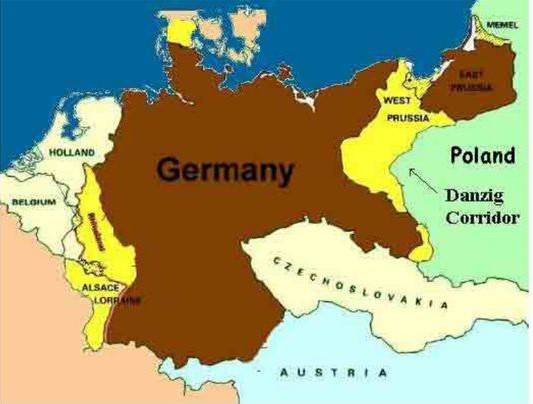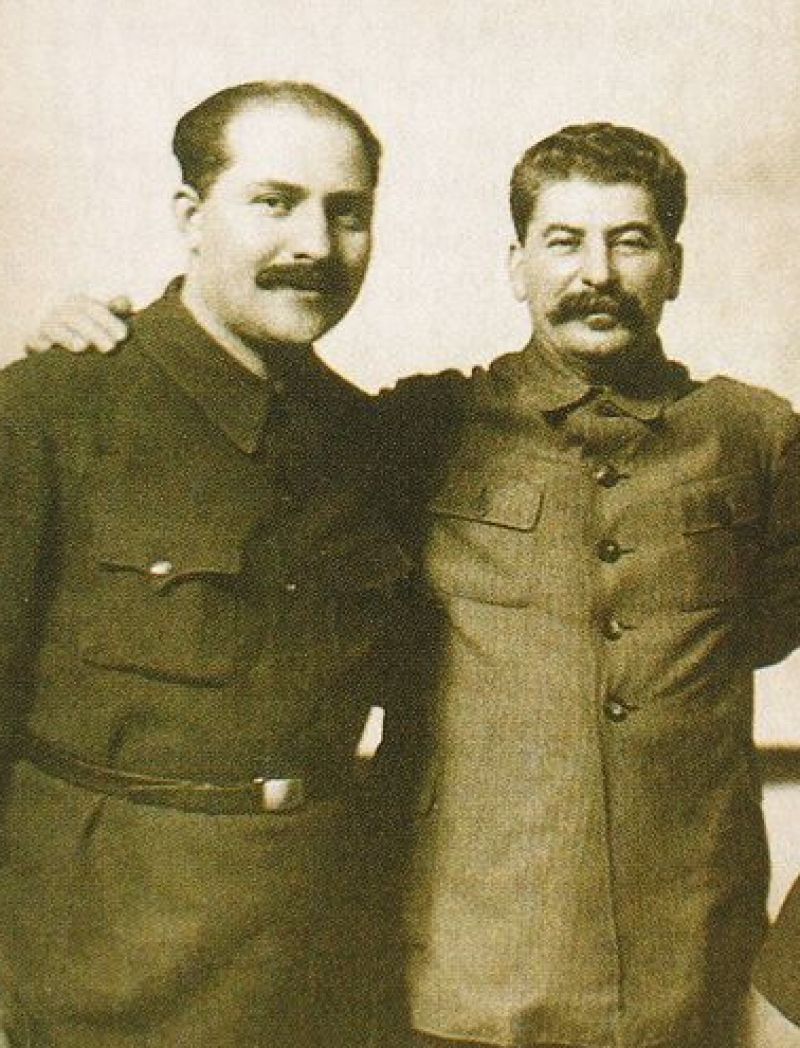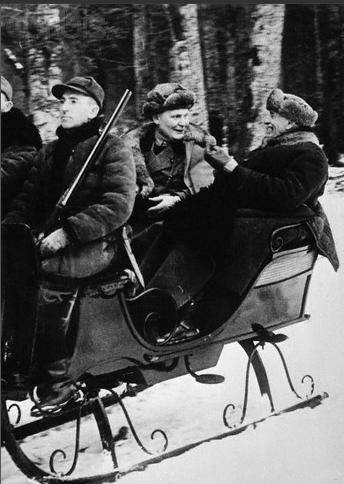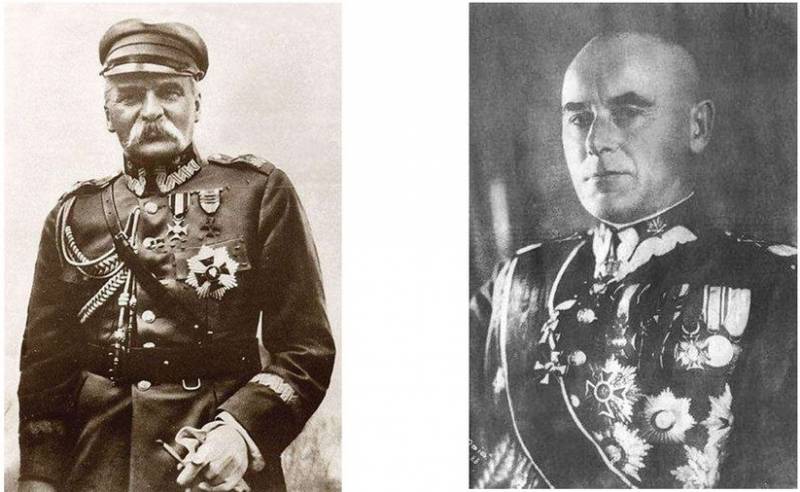Moscow - Warsaw: what the heirs of Mr. Pilsudski forgot
The head of the Polish state Jozef Pilsudski and his successor, Marshal Edward Rydz-Smigly
An ardent Russophobe, a former associate of the Russian revolutionaries, “pan Yozef” in his old age was by no means opposed to agreeing on many issues with the Soviets in one way or another. Most likely, by the end of his rule, the marshal understood that the “alliance” with Berlin or with London and Paris against Moscow and the permanent Polish-Soviet confrontation may well return to a boomerang re-established Poland. And even lead her to the repetition of the tragic fate at the end of the XVIII century.
However, Mark Aldanov, even during the life of the head of the Polish state, wrote that "Marshal Pilsudski lives at the same time as different, as if incompatible moods". But his much less authoritative comrades-in-arms, having buried the dictator, as if broke off the chain and openly competed in anti-Soviet rhetoric. The actual epilogue of the campaign was the statement of Marshal E. Rydz-Smigly (1886-1941), the commander-in-chief of the Polish army with 1936 g, made literally on the eve of the war with Germany. Then, in response to the proposal of the Soviet Defense Commissar K.E. Voroshilov on the supply of military materials to Poland, made by 26 August 1939, the Polish marshal said: "If we lose our freedom with the Germans, then with the Russians we will lose our soul." Is it worth reminding how it ended for the Second Commonwealth?
But are the indefinite strategic interests of Poland and the USSR-Russia, the issues of ensuring their security, diverging and diverging now? It is useful, in this regard, to recall that at the end of the 20-s - the first half of the 30-s of the last century, the trade, cultural, scientific ties between Poland and the USSR quickly grew. Traditional Polish efficiency has taken its toll - conquered, and you can bargain. At that time, the non-aggression pact was also signed; Soviet-Polish trade almost doubled. Moreover, the intelligence services of the USSR and Poland conducted about 10 successful joint operations against Ukrainian nationalists (OUN) on the southern and southeastern parts of the mutual border (on both sides of the border in Kamyanets-Podilsky region). It is clear that the higher ranks of modern Poland, with their compulsory support for Square, do not recall this, even when it is necessary to slightly besiege the overbearing Maidan politicians.
Documents show that the same OUN from the beginning of the 1930-ies "oversaw" not only Berlin: its representatives of different levels have long since been in contact with British, French, Italian intelligence services. In addition, the OUNists, from about 1934-35, were supported by neighboring Czechoslovakia and pro-German Hungary. Clement Gotwald wrote in great detail about this in his work “The Two-faced Beneš,” published in the 1951 year in Prague, including in Russian. About the same писал Ambassador in London, and then the Polish president in exile, already 80-s Edward Raczynski: E. Raczyński, “W sojuszniczym Londynie. Dziennik ambasadora Edwarda Raczyńskiego: 1939 – 1945; Londyn, 1960.
Today, he is even quoted by the Ukrainian press. In the coordinate system that developed in those years, the threat of the disintegration of Poland was quite real. The aging Polish leader Pilsudski could not leave calm the well-known interview with Hitler's London Sunday Express 12 February 1933, where the new German Chancellor did not even try to hide his plans: "... Polish corridor" (the territory of Poland between East Prussia and the main part of Germany in 1919 -1939 of the year. - Approx. Ed.) Hate all Germans, it must be returned to Germany. There is nothing more disgusting for the Germans than the current Polish-German border, the question of which should soon be resolved. ” In order to resist Germany, Pilsudski, like a real pragmatist, was ready to accept help not only from old allies, but also from old enemies such as Soviet Russia.

In the Nazi plans of numerous annexations, the Danzig Corridor is not a trifle, occupying one of the first places.
But almost all the encouraging strategic trends in relations between Warsaw and Moscow were soon interrupted by the “heirs” of Pilsudski, who with enviable ease were now focused on London and Paris, now on Berlin. But not on Moscow. But at the turn of 20-30's, the Soviet side was leaning towards a long-term dialogue with Poland. Judging by the real cases, already before the National Socialists came to power in Germany, the peaceful nature of relations with the USSR was also part of the plans of the Polish leadership. In principle, having a very long joint border, passing near large industrial centers and transport hubs, the two countries in one way or another should have been interested in long-term cooperation. However, the heirs of Pilsudski tried to look at the matter quite differently.
But back to the beginning of the 30's. 30 August 1931 year I.V. Stalin sent a letter to L.M. Kaganovich: “... why don't you report anything about the Polish draft pact (about non-aggression) passed by Patek (then Polish ambassador in Moscow) to Litvinov? This is a very important, almost decisive (for the next 2-3 of the year) issue of peace with Warsaw. And I am afraid that Litvinov, succumbing to the pressure of so-called public opinion, will reduce him to a “dummy”. Pay close attention to this matter. It would be funny if in this case we succumbed to the commonplace fad of “antipolonism”, forgetting even for a moment the indigenous interests of revolution and socialist construction ”(Stalin and Kaganovich. Correspondence. 1931 – 1936. Moscow: ROSSPAN, 2001. 71-73; RGASPI, 81 Foundation. 3 Op. 99 Case (12 – 14 Sheet. Autograph).

I.V. Stalin and L.M. Kaganovich
Soon, on September 7, Stalin accused L.M. of a new letter to Kaganovich. Karakhan (the then deputy commander of foreign affairs of the USSR) and M.M. Litvinov, that they "... made a gross mistake with respect to the pact with the Poles, for the elimination of which it takes more or less long time." And on September 20, the Politburo, having duplicated this opinion of Stalin, made the final decision: to seek the conclusion of a non-aggression pact with Poland. This document was signed in 1932 year.
Similar peaceful tendencies were also manifested from the Polish side. Thus, on the instructions of Pilsudski, the head of the Polish Foreign Ministry, Jozef Beck 27, March 1932, invited the Ambassador of the USSR in Poland V.A. Antonov-Ovseenko to a conversation. Beck expressed concern about the growing xenophobia in Germany; asked about the construction of the Dnieper, the Stalingrad tractor, "Magnitka". The interlocutors also spoke about the Russian and Polish participants in the 1905-1907 revolution.
Similar in nature was the visit of the representative of Pilsudski for special commissions, Bohuslav Medzinski, to Moscow in 1932 year. The transcript of his conversation with Stalin, who ultimately made a unique gesture, is especially impressive: he not only invited Medziński to the May Day parade: the Polish guest was given a place on the festive platform at the Lenin Mausoleum. A little later, already in 1934, Stalin noted that “who was caught between two fires (by fascist Germany and the Soviet Union), J. Pilsudski wanted to get out of this situation through the Polish-Soviet rapprochement. And it remains in the interests of the USSR. ”
The Polish dictator, contrary to the expectations of his subordinates, did not even try to prevent the Polish businessmen from moving closer to the Soviets. At the finish of the first Soviet five-year plan a number of mutually beneficial Polish-Soviet agreements on the development of trade were concluded. Operationally agreed not only on the fusion of timber on the Neman, but also on the transfer of most of the Polish archives in the USSR to Warsaw. Also documents of a scientific exchange, about tours of the Polish actors in the USSR and Soviet in Poland were signed. Plus, in August 1934, for the first time, the naval delegation of the USSR visited the port of Gdynia (the only port of Poland in the Baltic) for the first time.
And at the end of January 1935, Yu. Pilsudski, despite being seriously ill, invited Hermann Goering, then the Nazi no. 2, to go hunting. Goering, who was never ashamed of anyone, almost immediately offered the marshal to organize a campaign against Ukraine together, but received a clear answer from him: “Poland is interested in peaceful relations with the USSR, with which it has a thousand-kilometer common border”. Goering was taken aback, but in conversations with Pilsudski more did not return to this topic.

Goering settled in Belovezhskaya Pushcha before the occupation of Poland. In the photo - with the Polish President Mostsitsky, the second half of the 30-s.
In this sense, the reference of the embassy of the USSR in Poland about the Polish-Soviet relations from November 5 on November 1933 is very indicative:
For the near future, Poland’s policy will be “balancing” between East and West. But continuing the line on rapprochement with us, Poland will continue to strive not to tie its hands ”.
After the death of J. Pilsudski (in May 1935), the Polish-Soviet relations, unlike the Polish-German relations, began to deteriorate again. Among other things, and because of Polish participation in the section of Czechoslovakia on the Munich Agreement. The appetites of the new Polish leaders immediately increased sharply, and they were already developing plans for a military invasion of Lithuania, which had not come to terms with the loss of Vilnius back in the year 1920. Then the USSR intervened for the small Baltic republic, which subsequently greatly facilitated the process of its accession to the Union.
Almost at the same time, the rejection of Memel, the present Klaipeda from Lithuania, coolly done by Germany in March 1939 of the year Klaipeda, which was carefully hushed up today, happened. It is significant that in Poland it did not cause a negative reaction, although, incidentally, the Western press, following the example of politicians, expressed its irritation very, very briefly. But perhaps more importantly, the top Polish leadership clearly underestimated the future consequences of Germany’s unilateral denunciation of 28 on April 1939 of the German-Polish non-aggression pact of April (1934 of the year) by Germany. Unfortunately, in Warsaw, as is obvious, in Moscow, by the end of the 30s, they made a serious miscalculation when they openly “trusted” the possibilities of developing peaceful relations with Germany. And they preferred not to pay due attention to the aggressive, chauvinistic plans and concrete actions of the Nazis. It is characteristic that Soviet-Polish relations themselves fell into this “trap” skillfully created by Berlin.
But the German “Drang nach Osten” did not make almost any differences between Poland and Russia. Not by chance, under the cover of a diplomatic fleur, Germany immediately after the death of Pilsudski, sharply intensified work with the Western Ukrainian nationalist underground in Poland. And later, in September, 39, it no longer only carried out a series of attacks, but also struck the rear of the Polish troops. Including during the evacuation of the defeated Polish troops and civilians in Romania. "Defensive" could not oppose anything to it, since its cooperation with the NKVD against the OUN had already stopped since the 1937 year.
Let us take the liberty to conclude that the ruling circles of both Poland and the USSR after the death of J. Pilsudski seem to lack understanding of the situation and a desire to rise above short-term mutual sympathies and antipathies. In any case, the constant concessions that Germany made on various issues from the USSR and Poland were actually on the verge of a world war, could not help but increase the influence of Berlin in Eastern Europe. We rightly do not stop criticizing England and France for such “peacemaking”, although we ourselves, trying to ward off the Nazi threat from ourselves, have, alas, left them in our foreign policy, very close.
According to many experts, the Molotov-Ribbentrop Pact, and even 1 of September 1939, could have been prevented if Warsaw and Moscow were aiming at even forced, but closer, military-political cooperation with each other in anticipation of the real German threat. Moreover, according to a number of assessments, the “pragmatic” defense pact of the USSR and Poland (in addition to their non-aggression pact) would completely allow German troops to be blocked in East Prussia and strengthen the defense capability of Gdansk (Danzig) - a “free city” before the German aggression against Poland.
Naturally, the September Polish catastrophe of 1939 of the year was most strongly influenced by the same strange, as the subsequent "strange war" policy of Great Britain and France during the military-political negotiations with the USSR. The British and French ruling circles deliberately delayed these negotiations, limiting themselves only to confirming Poland’s notorious guarantees. But how these guarantees are specifically embodied, London and Paris did not specify. Today it is well known that the delegation of our future allies did not even have the authority to sign a military agreement with the USSR, but the “strange war” only confirmed that London and Paris had deliberately “surrendered” Poland.

Information